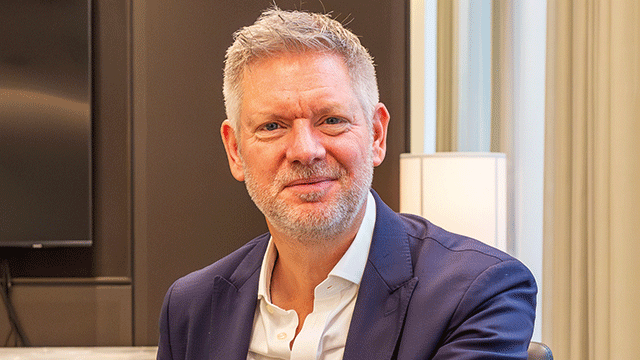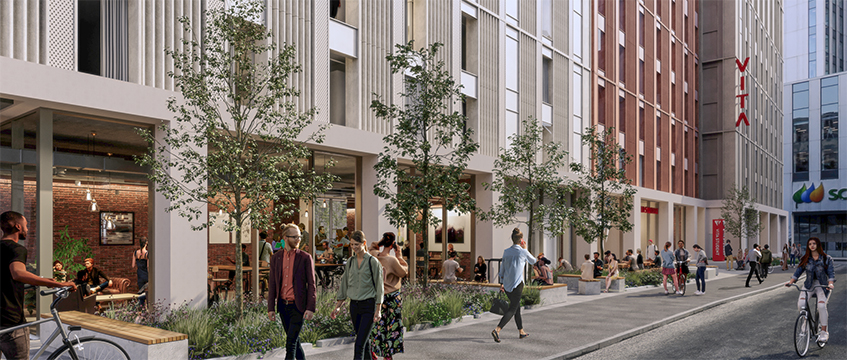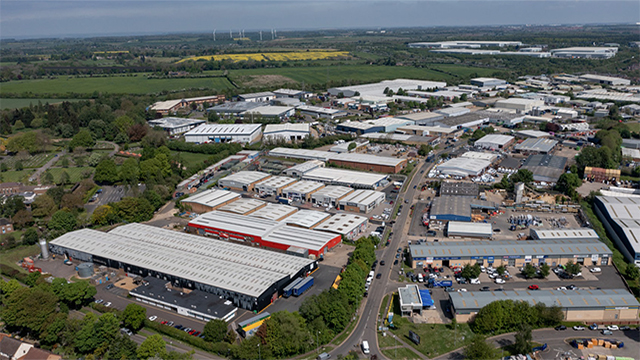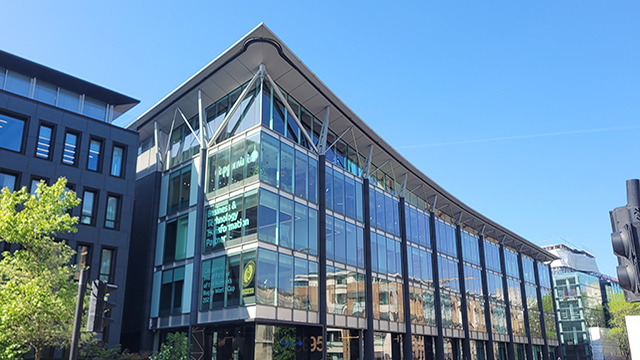The Collective’s Reza Merchant wants to change the world
At a company retreat for The Collective in Oxfordshire last November, a recent hire at the co-living company addressed the room joyfully: “There is nowhere else anybody wants to be right now. Everybody wants to be here.”
Such a sense of belonging is exactly what Reza Merchant, who set up The Collective a decade ago, wants to encourage. “There was such an incredible feeling in the air,” Merchant recalls. “A real sense of community. This is the feeling we are striving for.”
Merchant wants that sense of community to extend beyond his staff and out to the thousands of residents living in The Collective’s co-living properties – developments with small bedrooms but big scope to bring people together through extensive communal space.
At a company retreat for The Collective in Oxfordshire last November, a recent hire at the co-living company addressed the room joyfully: “There is nowhere else anybody wants to be right now. Everybody wants to be here.”
Such a sense of belonging is exactly what Reza Merchant, who set up The Collective a decade ago, wants to encourage. “There was such an incredible feeling in the air,” Merchant recalls. “A real sense of community. This is the feeling we are striving for.”
Merchant wants that sense of community to extend beyond his staff and out to the thousands of residents living in The Collective’s co-living properties – developments with small bedrooms but big scope to bring people together through extensive communal space.
That community has grown quickly. Since Merchant established the company, it has amassed a portfolio of around 9,000 co-living bedrooms across three countries, built a workforce of 300 employees and attracted backing of more than $1bn. Merchant believes it is now the largest co-living developer in the world. He wants the business to oversee 100,000 bedrooms by 2025.
As the company grows, Merchant believes its very name has become synonymous with co-living. “People often refer to co-living as ‘Collective living’,” he enthuses.
If that is reminiscent of WeWork growing into the poster child for the co-working sector, then Merchant and his Collective team seem aware of the risks of expanding too quickly and reaching too far. But the founder is nothing if not ambitious.
Still, as rents inch towards £2,000 a month for a small room at the company’s latest development at London’s Canary Wharf, The Collective must prove that its business and vision are sustainable.
Is its co-living offering truly developing an investable asset class in the future of mixed-use schemes and urban living? Or is it a part-time solution only for wealthy millennials?
What a feeling
The Collective claims that its recently opened Canary Wharf building is the world’s largest co-living scheme, with 705 bedrooms and 40,000 sq ft of amenity space. Think rooms measuring just 16 sq m (the new minimum), but with residents having access to a games room, library, wellbeing facilities and more.
On a tour of the building with Merchant, we wander through shiny gyms, surround sound cinemas, a Masterchef-style kitchen and a maze of communal space. On the 20th floor there is a sky pool, a spa offering a £154 hangover recovery drip, and the public restaurant Mthr, with dishes from the former head chef of restaurants at the Walkie Talkie and Centre Point.
[caption id="attachment_979049" align="aligncenter" width="847"] The Collective’s Canary Wharf location[/caption]
“Co-living ultimately comes down to a feeling that is created,” says Merchant when asked for The Collective’s elevator pitch. “That feeling is one of being part of a community and having a sense of belonging. In some ways you can look at what we do as true mixed-use development. It is looking at how you create that soul and atmosphere in a space.”
It’s a far cry from The Collective’s origins of £500 monthly rents and meet-ups over a barbecue. But those origins remain a big part of how Merchant pitches the business, even forming part of a training programme for new staff known as “The Collective Way”.
“I set the company up having had first-hand experience of how hard it was to find any remotely decent and affordable accommodation,” Merchant says. “It is through that personal experience and pain that the idea came about. The product evolved as we did.
“It’s that bottom-up approach and the fact that we are the consumer that makes us unique. We are not just a soulless corporate that thought co-living was a great idea. We did it before co-living even existed as a word.”
In 2012, Merchant took out a £1.8m 12-month bridging loan against his family home to kick-start the expansion of the business with the refurbishment of a 11,500 sq ft derelict mansion block in Camden, NW1. Now the company is courting UK pension funds, with DTZi at its side and a target to raise £650m for expansion.
Merchant says he has poured his heart into the business, and he wants others to take that same approach. “Part of it is a story, but part of it is also a service philosophy,” he says. “It all comes from a place of love.”
And as developers working across the student accommodation, hotel and residential sectors clamber on board the co-living bandwagon, Merchant believes The Collective will still stand out.
“If a bigger private equity fund decided to roll out a co-living platform, then yes, they can build buildings,” he says. “But the soul and the love that people put into their day-to-day won’t be there. What we are creating is a feeling that people get when they come here. That is what can’t be replicated.”
Walking the talk
As The Collective paves the way in co-living, staggering rents for amenity-packed buildings have left some onlookers questioning the longevity of the model.
In the wake of mounting problems at WeWork, all eyes are on The Collective. There are clear comparisons: a charismatic, meditating frontman driving the exponential growth of a sharing economy-based business in real estate. But Merchant insists he’s no Adam Neumann and The Collective is nothing like WeWork.
“Apart from a modest salary, I have never taken any dividends or money out of the business,” he says. “I have made a commitment to reinvest 90% of whatever I’m entitled to back into the business and eventually into our charitable foundation. That is in perpetuity, until the day I die.”
Merchant adds that he has no assets outside of the business. “I know that making a difference to the world and having a positive impact is going to give me far more satisfaction than any material possession.”
Populations are growing in cities all over the world and space is finite. Loneliness and isolation is increasing, so people see real potential for new ways of living, solving problems that cities need to face
He does not own a house, living instead in The Collective’s Canary Wharf building in one of the smallest suites. He has no car and travels light, usually armed with just a backpack. “It is about walking the talk. I would like to think my actions have demonstrated that we stand for what we preach.
“Our whole purpose as a business is to create long-term profitability, sustainably, but ultimately to make a difference.”
At Canary Wharf this means developing a number of community outreach programmes, including supporting entrepreneurship for young people at risk of falling into gangs. Other schemes focus on improving affordability and the company is pending B Corporation status, marking it as a business that meets high standards of social and environmental performance.
This “profit for purpose” ethos extends to employees and investors too. Merchant says he is working with The Collective Foundation to make sure employees give back through donating time or money to charitable causes.
Social impact and sustainability is high on the agenda for many institutional investors, and as an established business with a proven track record, Merchant says The Collective is attracting long-term backers with similar aspirations.
“If we smell that investors are not completely aligned and much more short-term, we just won’t work with them,” he says. “We’re at a stage now where we can be much more choosy about who we work with.
“Anyone who comes and works with The Collective or is involved with The Collective should be here because they want to make a difference, not just make money.”
Bricks and mortar
The one asset Merchant does have, of course, is the business and its £2.8bn global portfolio of assets. This stands in contrast to many co-working and co-living operators, which lease rather than buy space.
“The fact that we own real estate, rather than just leasing it, solidifies and further reiterates that our model is much more sustainable,” Merchant says. “At the end of the day, the bricks and mortar are a very important part of the business.”
[caption id="attachment_995206" align="aligncenter" width="847"] The Collective, Stratford[/caption]
The Collective’s business model delivers profit not only from the rents and services it provides, but also from developing the buildings and taking planning risk.
For the past nine years the company has pioneered the definition of co-living under the sui generis planning use class, which has typically been a bucket for all non-defined uses, such as student living. Working borough by borough and under two London mayors, this has been an enormous challenge.
Reluctance from the Greater London Authority saw The Collective’s Stratford scheme stalled for two years awaiting a rubber stamp from mayor Sadiq Khan, with the developer eventually abandoning the plans and submitting a new application for a short-stay hotel scheme.
Merchant says the hybrid short-stay offering is simply an evolution of the product to meet societal needs.
“As the world becomes more transient, more mobile, it is acknowledging travel really enabling people to spend time in different cities.”
This was the drive for The Collective’s overseas expansion strategy, he adds, providing an opportunity to create a global brand with a network of space and communities.
“Populations are growing in cities all over the world and space is finite. Loneliness and isolation is increasing, so people see real potential for new ways of living, solving problems that cities need to face.”
The Collective now has locations in the US and several sites in Germany that it will use for larger city regenerations, as opposed to single buildings. Merchant also points out that to deliver a “truly intergenerational offering” the schemes need to have at least 1,000 beds.
“As we establish more international locations we will open up a membership offering, so that members of The Collective can have access to spaces across cities,” he says. “I think that is going to be the future, where housing becomes global.”
As The Collective expands geographically and demographically, it is also adding corporate partnerships to boost its membership. Merchant says there are no concerns over his target to grow tenfold in just five years to 100,000 beds. “We’ll probably sit here in five years and add another zero on that,” he says.
As local planning authorities, members and investors buy in to The Collective’s vision, it is becoming a more mainstream offering. Pledges towards sustainability and social impact, and delivery of more affordable housing could help it meet longer-term aspirations.
But for all that, there is still a cult-like image that Merchant seems in no real hurry to shed.
“People have lived in tribes for tens of thousands of years, and we are now living in a world which is becoming lonely and isolated,” he says. “There is a need to create a sense of community. What we are doing is not for a specific market, we believe it is for everyone.”
To send feedback, e-mail emma.rosser@egi.co.uk or tweet @EmmaARosser or @estatesgazette











